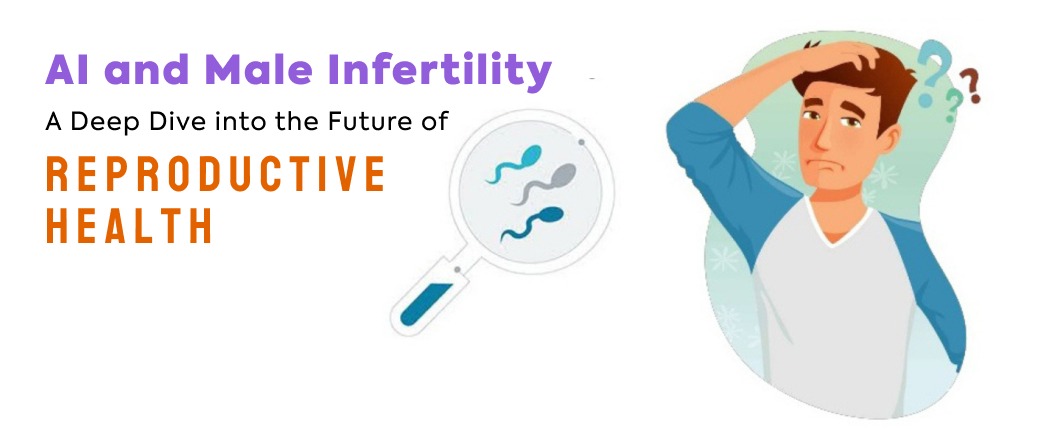Male infertility is responsible for nearly 40-50% of infertility cases worldwide. In an age of rapidly advancing medical technology, artificial intelligence (AI) is emerging as a groundbreaking tool to revolutionize the diagnosis, treatment, and prevention of male infertility. By leveraging machine learning, big data analysis, and predictive algorithms, AI is helping doctors and researchers make faster, more accurate decisions that can significantly impact fertility outcomes. This blog takes an extensive, factual look at the role of AI in tackling male infertility and its transformative potential for reproductive health. facing any issues then you must visit our Best andrologist in Hyderabad
Best andrology clinic in Hyderabad
Understanding Male Infertility
Before diving into AI’s role, it’s essential to understand the causes of male infertility. The most common reasons as per the experts of Best andrology clinic in Hyderabad for male infertility include:
Low Sperm Count (Oligospermia): Oligospermia refers to a condition where the semen contains fewer sperm than normal, which can reduce the chances of fertilizing an egg and lead to infertility.
- Poor Sperm Motility (Asthenozoospermia): In this condition, sperm have difficulty swimming properly, reducing their ability to reach and fertilize the egg, affecting male fertility.
- Abnormal Sperm Morphology (Teratozoospermia): This condition involves the presence of abnormally shaped sperm, which can impact the sperm’s ability to penetrate and fertilize the egg.
- Hormonal Imbalances: Hormones regulate sperm production, and imbalances in testosterone or other hormones can negatively affect sperm count and quality.
- DNA Fragmentation: Damage to the DNA within sperm can impair fertility by reducing the sperm’s ability to fertilize an egg or lead to early pregnancy loss.
- Genetic Conditions: Certain genetic abnormalities can affect sperm production and function, contributing to male infertility.
- Environmental Factors: Exposure to harmful toxins, chemicals, or radiation can damage sperm and reduce fertility.
- Lifestyle Factors: Habits like smoking, excessive alcohol consumption, obesity, or chronic stress can negatively impact sperm health and contribute to fertility issues.
Current diagnostic methods often rely on manual semen analysis, hormone level assessments, genetic testing, and lifestyle evaluations. However, these traditional methods can be subjective, time-consuming, and prone to human error. This is where AI comes into play.
Best andrologist doctor in Hyderabad
1. AI in Diagnostics: Transforming Semen Analysis and Sperm Health Evaluation
As per Best andrologist doctor in Hyderabad one of the biggest challenges in diagnosing male infertility is accurately analyzing sperm parameters such as count, motility, and morphology. Traditional manual semen analysis requires a highly trained technician and often varies between laboratories.
AI in Semen Analysis:
AI-based semen analysis systems are revolutionizing the process by making it more objective, efficient, and consistent. AI uses computer vision and deep learning to assess sperm characteristics with high accuracy. Examples include:
Computer-Assisted Semen Analysis (CASA): CASA systems employ AI algorithms to measure sperm count, motility, morphology, and vitality. CASA has been shown to be more precise than traditional manual assessments, reducing inter-observer variability. By analyzing thousands of sperm cells in real-time, AI-powered CASA systems can provide consistent and reproducible results, improving diagnostic reliability.
Sperm Motility Analysis: Sperm motility is one of the critical factors influencing fertility. AI-powered imaging software can analyze sperm movement patterns with great precision, differentiating between progressive motility (sperm moving forward efficiently) and non-progressive motility. These advanced algorithms can also detect subtle abnormalities in sperm movement that may be missed during manual analysis.
Sperm DNA Fragmentation:
DNA fragmentation in sperm refers to the breaking of DNA strands within the sperm cells, which can significantly impact male fertility. This condition is associated with poor reproductive outcomes, including issues like failed fertilization, low embryo quality, and recurrent pregnancy loss. High levels of DNA fragmentation can reduce the sperm’s ability to successfully fertilize an egg or lead to complications during pregnancy.
Current methods for detecting DNA fragmentation involve tests like the Comet assay and sperm chromatin dispersion (SCD) test. These techniques, while helpful, often have limitations in terms of accuracy and accessibility. They typically require manual handling under a microscope, which introduces a level of subjectivity and potential human error.
Artificial intelligence (AI)-based systems are being developed to overcome these challenges by offering a more precise and efficient way to assess DNA fragmentation in sperm. AI algorithms can be trained to scan sperm cells using molecular markers or advanced imaging techniques like fluorescence imaging. These technologies can automatically detect signs of DNA damage, making the process faster, more reliable, and objective compared to manual methods. The use of AI for assessing DNA fragmentation allows clinicians to identify men with high levels of DNA damage earlier in the infertility evaluation process. This early detection can lead to timely interventions, such as lifestyle changes, antioxidant therapy, or selecting the healthiest sperm for assisted reproductive techniques like IVF or ICSI, ultimately improving the chances of successful fertilization and healthy pregnancies.
2. AI in Treatment: Personalizing Fertility Treatments
Once a diagnosis of male infertility is confirmed, selecting the appropriate treatment becomes crucial. Fertility treatments can range from lifestyle changes, medications, to advanced procedures like assisted reproductive technology (ART) including in vitro fertilization (IVF) or intracytoplasmic sperm injection (ICSI). The challenge lies in determining the most effective treatment for each individual, as every case of infertility is unique.
This is where artificial intelligence (AI) plays a transformative role in personalizing fertility treatments. AI can analyze vast amounts of data related to the patient’s medical history, lifestyle factors, genetic information, and previous treatment responses. By processing this information, AI systems can provide insights into which treatment option would be most effective for a particular individual.
For example, AI can help identify patterns in the data, suggesting if a patient would benefit more from medication or if ART is the better choice. Additionally, AI can predict success rates for procedures like IVF or ICSI based on factors such as sperm quality, DNA fragmentation, and the patient’s overall health. This level of precision in personalizing treatments not only improves the chances of success but also minimizes unnecessary interventions, reducing both emotional and financial stress for patients.
By integrating AI into fertility care, doctors can tailor treatment strategies more effectively, ensuring that patients receive the best possible care based on their unique profiles.


AI-Assisted Sperm Selection for ICSI (Intracytoplasmic Sperm Injection):
ICSI is a common ART procedure where a single sperm is injected directly into an egg to facilitate fertilization. The success of ICSI depends heavily on selecting the most viable sperm. Currently, embryologists select sperm based on manual observations of motility and morphology, but this is often subjective.
AI-driven tools for sperm selection are gaining momentum. For example:
Sperm Selection via AI: AI systems can assess sperm health by analyzing motility, morphology, and even molecular markers that are invisible to the human eye. Using advanced imaging and machine learning, AI can help embryologists choose the most optimal sperm for ICSI, reducing human error and increasing the chances of successful fertilization.
Optimizing IVF Success with AI:
In vitro fertilization (IVF) success is highly variable and depends on several factors, including sperm health, egg quality, and embryo viability. AI can analyze patient data—such as hormonal profiles, age, and sperm parameters—to predict IVF outcomes and recommend personalized treatment protocols.
One notable AI tool, Life Whisperer, uses deep learning algorithms to assess embryo viability. By analyzing images of embryos taken during IVF, the AI can predict which embryos are most likely to result in successful pregnancies. In male infertility cases, AI helps ensure that the most viable sperm and embryos are selected, increasing success rates.
3. AI in Predictive Modeling: Identifying Fertility Risk Factors
AI excels at predictive modeling, analyzing vast amounts of data to identify patterns and trends. In the context of male infertility, AI can help predict the risk of infertility based on genetic, environmental, and lifestyle factors.
Genetic Risk Prediction:
Genetic factors play a role in male infertility, especially in conditions such as Y-chromosome microdeletions, Klinefelter syndrome, and other chromosomal abnormalities. AI-based genetic analysis tools can help identify men at risk of infertility by analyzing their genetic makeup.
For instance, machine learning models are being developed to analyze single nucleotide polymorphisms (SNPs) and other genetic markers linked to infertility. By identifying genetic predispositions early on, AI can enable early diagnosis and more targeted interventions.
Environmental and Behavioral Tracking:
Environmental toxins, such as pesticides, heavy metals, and endocrine disruptors, are known to impact male fertility. AI-powered wearables and mobile applications can track men’s exposure to environmental factors and lifestyle habits (such as smoking, alcohol consumption, and exercise) in real-time. These AI-driven systems can then provide personalized recommendations to mitigate risk and improve fertility.
For example, AI-enabled fertility apps can monitor hormone levels and provide tailored advice on improving reproductive health. Some apps can even integrate data from both partners, providing a more holistic approach to fertility management.
4. AI in Assisted Reproductive Technologies (ART): Revolutionizing Embryo Selection
One of the most critical aspects of IVF is selecting the most viable embryo for implantation. Traditionally, embryologists rely on visual observation and static imaging to assess embryo quality. However, this process can be subjective and prone to error.
AI-Powered Embryo Selection:
AI algorithms, such as those developed by EmbryoScope, are transforming embryo selection by analyzing time-lapse images of embryo development. These tools can track embryo growth patterns over several days, identifying subtle developmental cues that indicate which embryos are most likely to lead to successful pregnancies.
AI tools are capable of assessing the entire developmental trajectory of an embryo—something that manual methods cannot achieve. This not only improves IVF success rates but also reduces the risk of multiple pregnancies by enabling more accurate single-embryo transfers.
5. AI and Lifestyle Interventions for Male Fertility
Lifestyle factors such as diet, physical activity, and stress can significantly impact sperm health. AI-based platforms are now integrating lifestyle data to offer personalized recommendations for improving fertility outcomes.
AI-Based Fertility Apps:
AI-powered apps like Yo Sperm and TrackMyFertility allow men to track their sperm health, receive personalized advice, and monitor improvements over time. These apps use AI to analyze data from semen tests, lifestyle factors, and hormone levels, providing insights into how everyday habits impact fertility.
For example, an app might recommend dietary changes, exercise routines, or stress management techniques based on AI analysis of a user’s health data. Over time, users can track improvements in sperm health and fertility potential.
6. Ethical Considerations and Future Outlook
As AI continues to transform male infertility treatment, ethical considerations must be addressed:
Data Privacy: AI systems rely on large datasets that may include sensitive genetic, medical, and personal information. Ensuring the privacy and security of this data is paramount.
Accessibility: While AI promises to democratize fertility care, there is a risk that these technologies may not be accessible to all patients due to cost or geographic limitations. Ensuring equitable access to AI-driven fertility treatments will be crucial.
Algorithm Bias: AI systems are only as good as the data they are trained on. If the training data is biased, the resulting AI tools may also exhibit bias, potentially leading to inaccurate diagnoses or treatments.
The Future of AI in Male Infertility
AI’s ability to analyze vast amounts of data, predict outcomes, and personalize treatments makes it a powerful tool in the fight against male infertility. As AI technologies continue to advance, we can expect even greater precision in diagnostics, more effective treatments, and improved success rates in assisted reproductive technologies.
In the future, AI may become a standard part of fertility clinics worldwide, offering hope to millions of men struggling with infertility. By integrating AI into fertility care, we can move closer to a future where no couple has to face the heartache of infertility alone.
Conclusion
AI is reshaping how we understand and treat male infertility. From improving diagnostic accuracy to enhancing treatment outcomes, AI offers a promising future for men struggling with fertility issues. As the technology matures, AI will continue to play a crucial role in personalizing care, improving success rates, and ultimately helping more couples achieve their dream of starting a family.
FAQ
1. What is Computer-Assisted Semen Analysis (CASA)?
CASA is an automated system used to analyze semen samples by evaluating sperm parameters like concentration, motility, and morphology. It uses cameras and software to capture and analyze microscopic images of sperm, providing objective, accurate, and reproducible results. CASA helps reduce human error and subjectivity typically found in manual semen analysis methods.
2. How does AI improve semen analysis?
AI enhances semen analysis by automating the evaluation process. Through deep learning algorithms, AI can more accurately assess sperm concentration, motility, and pH levels, reducing the time required for manual evaluation. AI systems can detect patterns in sperm movement and characteristics, leading to more consistent results and improving diagnostic accuracy for male infertility.
3. How can AI improve sperm morphology analysis?
AI, specifically deep learning technologies, can help CASA systems better understand and classify sperm morphology. AI algorithms can be trained to recognize different types of sperm abnormalities, improving the accuracy and objectivity of sperm morphology assessments. This can enhance the overall evaluation process and lead to better fertility treatments.
4. What role does AI play in sperm DNA fragmentation analysis?
Sperm DNA fragmentation (SDF) is an important factor in male fertility. AI can automate the process of measuring SDF, reducing subjectivity and human error. AI-powered systems can accurately assess the extent of DNA damage in sperm, which helps in selecting sperm with higher DNA integrity, improving the chances of successful fertilization and healthy pregnancies.
5. How does AI help in detecting sperm capacitation and hyperactivation?
AI enhances the ability to monitor sperm capacitation, a process essential for fertilization. CASA systems, equipped with AI algorithms, can track and classify sperm motility patterns specific to capacitation and hyperactivation. This makes it easier to predict the fertilizing potential of sperm, improving the chances of success in IVF treatments.
6. What is the significance of AI in sperm selection for assisted reproductive techniques (ART)?
AI plays a crucial role in selecting the best sperm for ART, such as in-vitro fertilization (IVF) and intra-cytoplasmic sperm injection (ICSI). AI can analyze large datasets of sperm characteristics, including morphology, DNA integrity, and chromosomal health. This helps embryologists make informed decisions in selecting the highest quality sperm, increasing the likelihood of pregnancy and successful birth outcomes.
7. How does AI handle big data in andrology?
AI can process vast datasets, known as big data, in the field of andrology. By analyzing large volumes of information related to sperm quality, environmental factors, and biochemical markers, AI can predict fertility outcomes and provide early detection of male infertility issues. This helps healthcare providers develop personalized treatment plans for patients.
8. Can AI be used to manage medical data in fertility clinics?
Yes, AI can be utilized to manage medical records in fertility clinics. By analyzing patient data stored in electronic medical records (EMR), AI systems can assist doctors in diagnosing fertility problems and providing accurate treatment recommendations. However, privacy and data security concerns need to be addressed when implementing AI for medical data management.
9. What are the future prospects of AI in male infertility treatment?
The future of AI in male infertility treatment looks promising. AI will likely continue to improve semen analysis accuracy, sperm selection for ART, and the detection of DNA fragmentation. As AI technologies advance, they may lead to the development of more precise, non-invasive, and cost-effective methods for diagnosing and treating male infertility, potentially increasing success rates for fertility treatments.
10. What challenges does AI face in male infertility diagnostics?
Despite its potential, AI faces challenges in male infertility diagnostics. These include the need for larger datasets to train AI models, standardization across different tools and labs, and integrating AI with existing diagnostic procedures. Additionally, concerns around data privacy and security, especially when dealing with sensitive health information, must be addressed as AI adoption grows in the field of reproductive health.
11. How reliable are AI-based semen analysis systems compared to manual methods?
AI-based semen analysis systems have shown high accuracy, particularly in measuring sperm concentration, motility, and DNA fragmentation, when compared to manual methods. However, there are still some inconsistencies, especially in assessing sperm morphology, due to the complexity of classification. Continuous research and development are needed to improve the reliability of AI-based systems in all areas of semen analysis.
By leveraging AI, the field of male infertility is experiencing advancements in both diagnosis and treatment, offering hope to many couples seeking fertility solutions.

